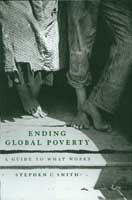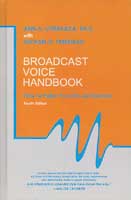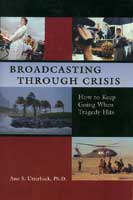|

Pursuing the
American Dream
 The American dream shines brightly throughout
My Fathers’ Houses: Memoir of a Family (William Morrow, 2005), by renowned journalist
and media personality Steven V. Roberts, GW’s
Shapiro Professor of Media and Public Affairs.
In this colorful and inspiring story, Roberts
transports readers to his childhood home in Bayonne,
N.J., where he says he was “connected by
innumerable little cords to people and places
that gave me strength and identity.” The American dream shines brightly throughout
My Fathers’ Houses: Memoir of a Family (William Morrow, 2005), by renowned journalist
and media personality Steven V. Roberts, GW’s
Shapiro Professor of Media and Public Affairs.
In this colorful and inspiring story, Roberts
transports readers to his childhood home in Bayonne,
N.J., where he says he was “connected by
innumerable little cords to people and places
that gave me strength and identity.”
Surrounded by family and tales of the Old Country,
Roberts grew up in the forties and fifties on
a crowded block in working class Bayonne, just
across the Hudson River from New York City, in
a house built by his immigrant grandfather. “On
the Block, I was safe, secure, loved,” he
writes. “I even had a number, 174, the
address of our house, but the number wasn’t
a badge of anonymity. To the contrary, it marked
my place, where I belonged.”
Roberts traces the history of his immigrant
family from Russia, where the “family business” of
writing and ideas was born, through Palestine
to Bayonne. Along the way, he tells tales of
his great uncle, who was an editor of Pravda,
two great aunts, who were original members of
the Bolshevik party, his grandfather, a Zionist
pioneer who helped to build the second road in
Tel Aviv before settling in America, and his
parents, who penned close to 100 love letters
to one another before secretly marrying. His
father, an acclaimed children’s book writer
who used his twin sons—Steve and Marc—as
inspiration for his bestselling stories, and
his uncle, a critic and short story writer, instilled
in Roberts a lifelong love for words and a passion
for carrying on the family legacy.
Now a journalist for more than 35 years, Roberts
also recounts his own path to the top—from
his early days as a 14-year old cub reporter
for his hometown newspaper to his illustrious
25-year career at The New
York Times. Throughout,
this compelling story of fathers and sons encapsulates
the American experience of change and continuity
and celebrates the American dream.
Roberts, who teaches political science and
journalism at GW, is a well-known commentator
on radio and television. He and his wife, TV
journalist Cokie Roberts, wrote The
New York Times best-seller, From
This Day Forward.
Conquering World Poverty
 The numbers are chilling. More than 800 million
people worldwide suffer from chronic hunger.
Every day, some 30,000 children in developing
countries die from preventable causes—almost
11 million this year alone. GW Professor of
Economics Steven C. Smith offers strategies
for tackling world poverty in his new book,
Ending Global Poverty:
A Guide to What Works (Palgrave Macmillan, 2005). The numbers are chilling. More than 800 million
people worldwide suffer from chronic hunger.
Every day, some 30,000 children in developing
countries die from preventable causes—almost
11 million this year alone. GW Professor of
Economics Steven C. Smith offers strategies
for tackling world poverty in his new book,
Ending Global Poverty:
A Guide to What Works (Palgrave Macmillan, 2005).
Smith, who directs GW’s Research Program
in Poverty, Development, and Globalization, explores
the myriad traps that keep people entrenched
in poverty—like malnutrition, illiteracy,
and poor access to health care—and presents
eight keys to escaping those traps. These “keys
to capability”—ranging from basic
education, which builds the foundations for self-reliance,
to personal and community empowerment, aimed
at ensuring effective participation in the wider
world, help people gain the tools to break out
of the bondage of extreme poverty.
The book also offers comprehensive strategies
for building capabilities and assets among the
impoverished and provides an extensive set of
anti-poverty initiatives and programs aimed at
conquering human poverty in a single generation.
Smith is co-author, with Michael Todaro, of
a leading text in the field, Economic Development
(8th Ed., Addison-Wesley/Pearson, 2002), and
has done on-site work in a number of developing
countries, including Bangladesh, Ecuador, Egypt,
Kenya, India, Peru, and Uganda. He has taught
courses on economic development with an emphasis
on problems of poverty since 1983.
Best of Broadcasting
 GW Vice President for Communications and Professorial
Lecturer in Journalism Michael G. Freedman recently
made substantial contributions to two new books
that are creating a buzz in broadcast newsrooms
across the country. GW Vice President for Communications and Professorial
Lecturer in Journalism Michael G. Freedman recently
made substantial contributions to two new books
that are creating a buzz in broadcast newsrooms
across the country.
Freedman is a contributing author of the Broadcast
Voice Handbook: How to Polish Your On-Air Delivery,
fourth edition, by broadcasting voice expert
Ann S. Utterback (Bonus Books, 2005). Used in
many newsrooms, the book teaches electronic journalists
how to get the most out of their voices. Freedman,
who has written the foreword of every previous
edition of the book, now leaves his imprint on
the entire volume. The results of his 2004 Survey
of News Managers appear in the book’s appendices.
 Freedman also wrote a chapter in Utterback’s
newest book, Broadcasting
Through Crisis: How to Keep Going When Tragedy
Hits (Bonus Books,
2005). The book, which provides broadcasters
with the tools to stay healthy and emotionally
balanced when covering wars, terrorist events,
and everyday tragedies, teaches journalists how
to cover crisis events without becoming overwhelmed
by them. In his chapter, “War Stories,” Freedman
provides an overview of war coverage from World
War II to the present, drawing on the personal
experiences of top luminaries in the field of
war reporting, including Walter Cronkite, Richard
C. Hottelet, the late George Herman, Liz Trotta,
Marvin Kalb, and Cami McCormick. Freedman also wrote a chapter in Utterback’s
newest book, Broadcasting
Through Crisis: How to Keep Going When Tragedy
Hits (Bonus Books,
2005). The book, which provides broadcasters
with the tools to stay healthy and emotionally
balanced when covering wars, terrorist events,
and everyday tragedies, teaches journalists how
to cover crisis events without becoming overwhelmed
by them. In his chapter, “War Stories,” Freedman
provides an overview of war coverage from World
War II to the present, drawing on the personal
experiences of top luminaries in the field of
war reporting, including Walter Cronkite, Richard
C. Hottelet, the late George Herman, Liz Trotta,
Marvin Kalb, and Cami McCormick.
Freedman is the former general manager of CBS
Radio Network News in New York and managing editor
for the Broadcast Division of United Press International
in Washington. During his 30-year career as a
broadcast journalist, network executive, and
university administrator, he and his teams have
received more than 85 awards for broadcasting
excellence.
—JLF
|